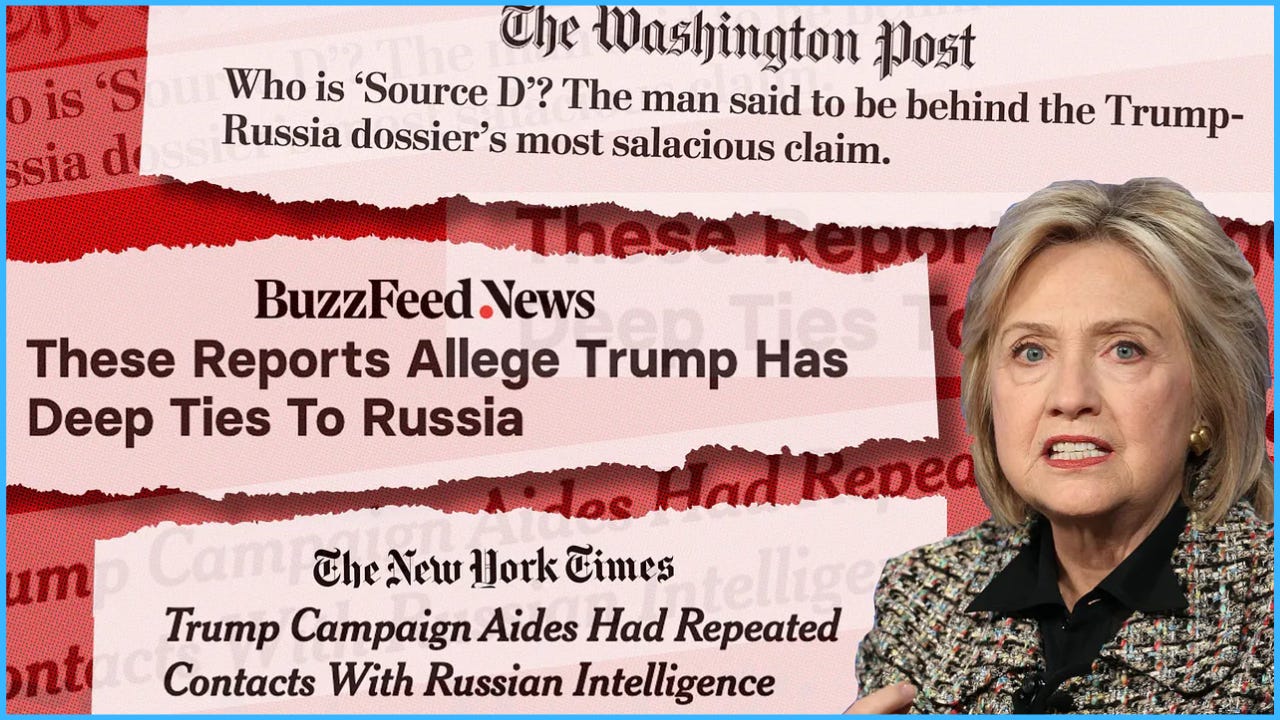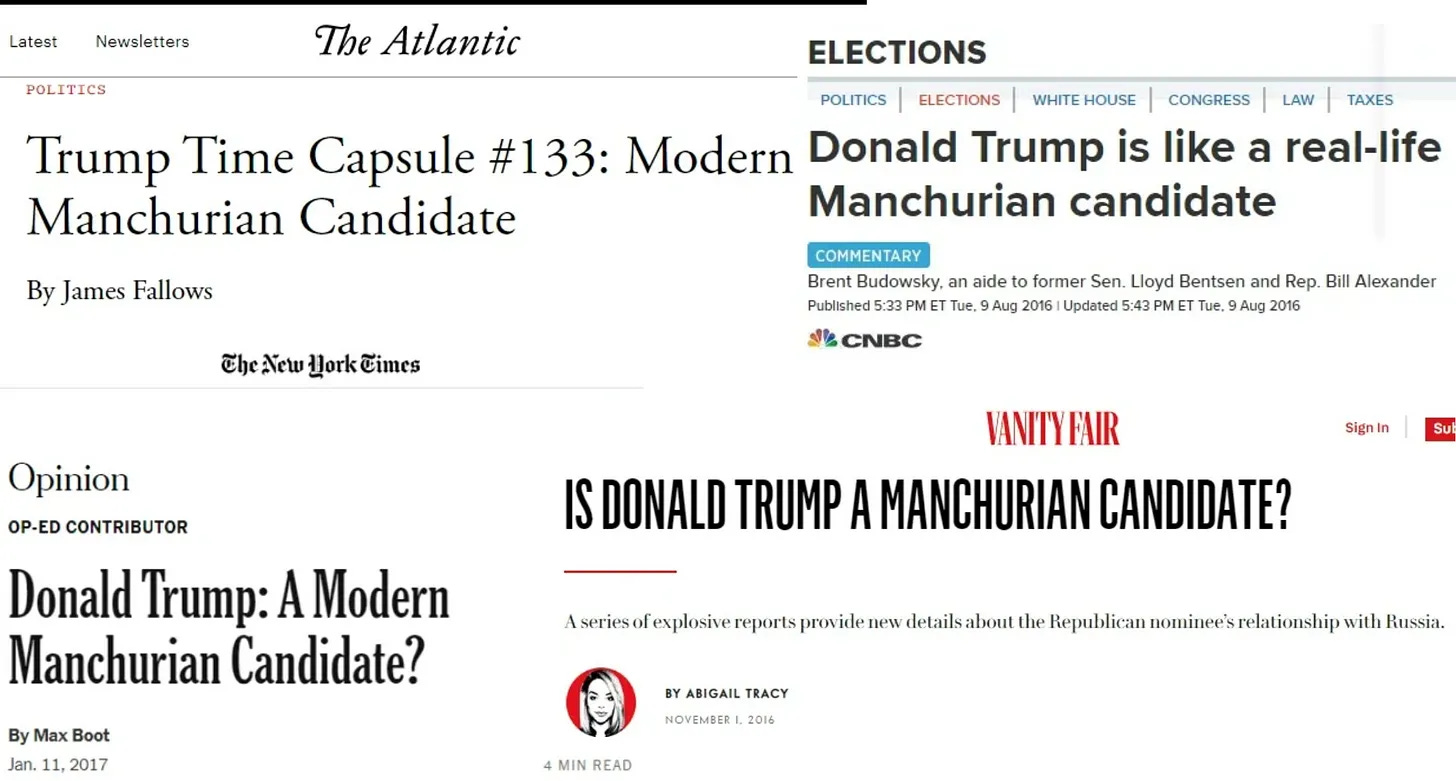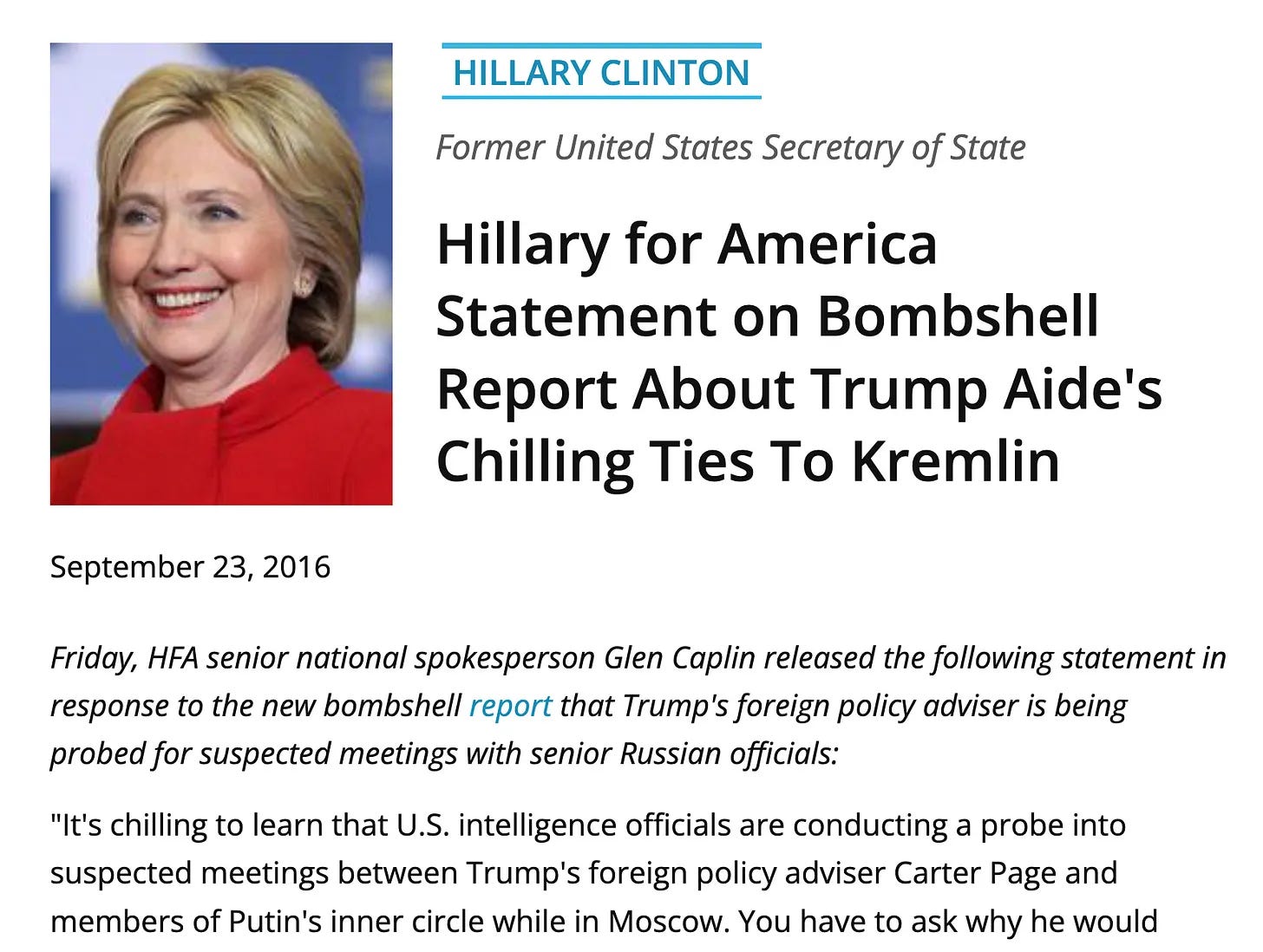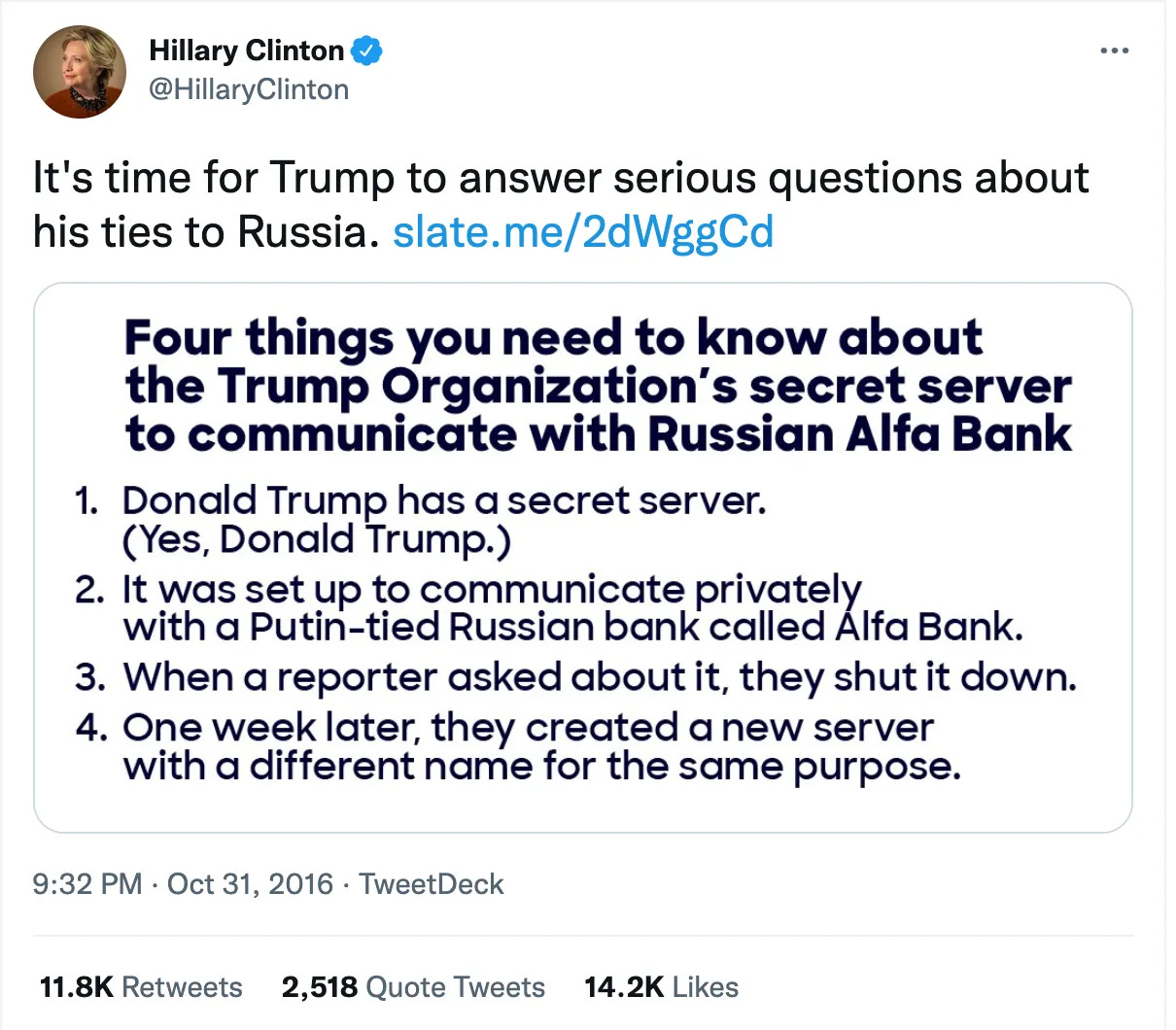Don't Fall for the Left's "Misinformation" Hypocrisy
If misinformation on Twitter mattered, Hillary would've been banned a long time ago.
While not entirely surprising, it’s nevertheless incredibly annoying that the media has taken to the rooftops to sound off about a purported rise in “misinformation” now that America’s most popular news platform, Twitter, is in the hands of Elon Musk. The most recent volley of warnings comes in response to the company’s decision to no longer enforce its covid “misleading information policy”—a policy that allowed officials to lie repeatedly while dissidents were punished for telling the truth.
“Musk has committed to free speech on Twitter, which might partially explain why the change was enacted,” writes CNBC. “But online safety experts have contended his approach has led to an increase in hate speech, harassment and misinformation on the platform.”
Ah, yes. The much esteemed “online safety experts,” the nation’s discourse police.
These “experts” are the newest foot soldiers of the intellectual vanguard that has been deemed unimpeachable by the “content moderation” movement. Convinced that the free exchange of ideas is simply too dangerous to be allowed in the hands of the layfolk, these completely made up authorities have been called into service to save us from ourselves lest we engage in unfettered speech, which we all know leads to Trump and fascism and death.
The Left now takes the position that combating misinformation1 is a more important “bedrock of democracy” than free speech. The problem is that they’re constantly blurring the lines between misinformation and reporting that simply makes Democrats and their media allies look bad.
This pattern is something Matt Taibbi has also covered, and it stretches back to 2016, when the leaked-but-true Podesta and DNC emails were regularly described as elements of a “misinformation campaign.” The screenshot below comes from the Twitter Files and serves as a reminder that a sprawling censorship regime was constructed specifically to “mitigate the real-time harm” that’d been done to Hillary Clinton.2
Perhaps the most relevant example of the intentional blurring of misinformation and reporting that reflects poorly on Democrats is the Hunter Biden story. There was never any evidence that the materials were false, and yet newspapers regularly described it as reading “suspiciously like disinformation” or a “misinformation test for social media.”
Take a gander at the timeline of “Fox News misinformation in 2020” put out by Media Matters, a media-criticism agency founded by liberal political consultant David Brock. These are verbatim entries from December 2020:
— Fox News went all in promoting the New York Post’s story about an alleged Hunter Biden laptop, but the story didn’t make any sense to begin with. [Fox & Friends, 10/14/20]
— Fox guest says now is not the time to discuss climate change’s impact on Australian bushfires. [Fox & Friends, 1/15/20]
—Steve Doocy complains that Speaker Nancy Pelosi wore pink while signing articles of impeachment. [Fox & Friends, 1/16/20]
—Fox News host criticizes Dr. Fauci’s quarantine recommendations: It will hurt businesses too much. [The Next Revolution, 3/22/20]
—Laura Ingraham: “The lie is that America is a systemically racist country.” [The Ingraham Angle, 9/23/20]
How does any of this qualify as “misinformation”? It doesn’t, unless you define misinformation as anything that rankles liberals. We have reached the point where they knowingly confuse erroneous or deceptive information with that which merely contradicts left-wing pieties. The ability to arbitrarily decree this or that to be misinformation has become a key tactic amongst those who agitate for greater and more repressive control over the internet to stifle views that deviate from establishment liberalism. It’s as simple as that.
What Real Misinformation Looks Like
It’s funny, because poor Hillary should’ve had her Twitter account banned a long time ago under the platform’s policy against misinformation, which includes a prohibition against “misleading” media that is “likely to result in widespread confusion on public issues.”3
This past May, in the trial of former Clinton campaign lawyer Michael Sussmann, prosecutor Andrew DeFilippis asked ex-campaign manager Robby Mook about the decision to share with a reporter a fake story alleging Trump’s connection to Russia-based Alfa Bank. Mook didn’t beat around the bush: “I discussed it with Hillary,” he said, describing his pitch to the candidate: “Hey, you know, we have this, and we want to share it with a reporter… She agreed to that.”
Fox News and the New York Post were the only outlets to cover this admission — a bombshell story — because the mainstream media is quite literally the propaganda arm of the Democratic Party, but it’s impossible to overstate how massive of a fraud was perpetrated on the public with Russiagate, and Mook’s testimony implicated Hillary Clinton in arguably the most elaborate disinformation campaign of all time. It’s incredible, really, how much power comes with control of the media. Democrats have been able to largely memory hole the biggest political scandal since Watergate by simply directing the public’s attention elsewhere.
Part of the problem is that there’s no coherent term for what the Clinton campaign did. Essentially, Russiagate was oppo research — complete bullshit — laundered through legacy media with help from anti-Trump factions within our national security apparatus sympathetic to Hillary’s cause. Democrats sent bilge stamped with her imprimatur to the FBI, who in turn lied to the secret FISA court and obtained “legal” surveillance authority over former Trump aide Carter Page, which then allowed for searches of everyone connected to Page, which obviously included the entire Trump team.
The end result was a resoundingly successful, years-long campaign of official harassment and media fraud that capitalized on security state connections and propaganda to generate actual criminal and counterintelligence investigations, and every bit of it was based on lies.
To say that the mainstream media obsessed over the collusion narrative for more or less four consecutive years would be an understatement. Coverage of the Trump-Russia investigation was premised entirely upon a broad, implied promise that proof of conspiracy in the form of Watergate-style revelations would be forthcoming from the fearless press. As late as September 2020, the Washington Post was still asking without a shred of irony whether or not Trump was a Russian agent.
How exactly does any of this not fit the definition of misinformation? Again: Twitter’s policy prohibits “misleading” media that is “likely to result in widespread confusion on public issues.” I feel like one can safely conclude that the launching of thousands of false stories over a period of years, ultimately leading millions of people to believe lies and expect news that never arrived, caused “widespread confusion on public issues.”
And there’s no question that the media’s preoccupation heavily influenced public perception,4 with many Americans lapping up the lies, wholly convinced that it wasn’t a matter of if the “smoking gun” would be discovered and Donald Trump imprisoned for betraying his country and rigging an election, but when.
Recall the frenzied atmosphere during the earliest stages of the Russiagate hoax following the release of an Intelligence Assessment by Director of National Intelligence James Clapper’s office on January 6, 2017, which concluded Russia ordered an “influence campaign” with a “clear preference” for Trump.5 Then, just days later, someone leaked to CNN that four intelligence chiefs — Clapper, CIA head John Brennan, FBI chief James Comey, and the NSA’s Mike Rogers — presented Trump with “claims of Russian efforts to compromise him.” Speculation about the new president being an actual Manchurian Candidate under Russia’s control immediately reached a fever pitch.
Before the Trump presidency had even begun, the media successfully used such stories to define the administration, undermining its legitimacy. An Economist/YouGov poll from late December 2016 — long before Russiagate reached peak hysteria — showed an astounding 50% of Clinton voters believed Russia had “tampered with vote tallies.”
And here’s where things get truly nefarious. Like, House of Cards-level corrupt. We now know the initial public accusations that Trump “colluded” with Russia came entirely from the Clinton campaign via fraudulent information disseminated to the public in two disinformation streams.
The first ploy was the dossier generated by former British spy Christopher Steele on behalf of Fusion-GPS, the opposition research firm hired by Clinton. Countless bogus headlines would ultimately be based on this phony document, beginning with a Yahoo! article that claimed Trump aide Carter Page was a “possible back channel” mediating “significant and disturbing ties” between Trump and the Kremlin. The Clinton campaign pretended to be positively shocked:
Soon after, there was the aforementioned leak to CNN of the James Clapper Intelligence Assessment, which contained a classified annex based on Steele’s claims about Russia having “compromising material” on Trump.6 CNN claimed that “anonymous sources” had described a “continuing exchange of information” between “Trump surrogates and intermediaries for the Russian government.” Just days later, Buzzfeed published the entire Steele dossier, which commenced a four-year saga featuring a conga line of imbecilic journalists chasing after inanities like the “pee tape.”
The Clinton campaign’s second ploy was the ridiculous Alfa Bank story. Basically, Clinton’s lawyer, Michael Sussmann, teamed up with some computer nerds who illegally obtained non-public data from a federal contract to put together a white paper alleging that a secret “Trump server” discovered by unnamed internet experts was communicating with a Russian bank by way of a “mysterious computer back channel,” as the New York Times put it. The claim was beyond stupid. Indeed, according to the Sussmann indictment, researchers worried they “couldn’t make any claims that would fly public scrutiny,” with one dude literally saying: “The only thing that drives us at this point is that we just do not like [Trump]… Folks, I am afraid we have tunnel vision. Time to regroup?”
Did they “regroup”? Negative, Ghost Rider.
Instead, the Clinton campaign had Sussmann submit this laughable fabrication to the FBI7 before leaking it to the media with the explicit approval of Hillary Clinton, who once again pretended, in a now infamous tweet, to be completely taken aback by the lies she’d just laundered through the FBI and her media pals:
She then posted another tweet on the same day:
The FBI went on a wild goose chase to investigate Sussman’s conspiracy theory, quickly determining that there was no evidentiary basis to believe any of it, as the indictment makes clear:
So stupid was this alleged Alfa Bank plot that Robert Mueller didn’t even bother to mention it in his comprehensive final report, which admitted that “the investigation did not establish that members of the Trump Campaign conspired or coordinated with the Russian government in its election interference activities.”
And yet this ploy, just like the Steele dossier, significantly shaped coverage of the 2016 election. With Hillary Rodham Clinton herself spurring on the propaganda, the mainstream media used these fake claims to engineer a narrative about Trump supposedly colluding with Russia. The criminality of the Clinton campaign features prominently in this tale, as does a systemically corrupt corporate media that perpetrated the scam on the public.
This is why you should respond with derisive laughter when the Left cries wolf about a purported rise in misinformation on Twitter now that Musk is rolling back censorship. Because whatever examples they might point to, there’s simply no comparison to the massive disinformation campaign of political sabotage in the form of fake news stories that Hillary Clinton and her allies commissioned to undermine Trump. The entire Russiagate narrative was premised upon systematically planted Clinton-concocted lies laundered through intelligence agency officials and mainstream journalists who were either willing dupes or witting accomplices because they wanted Trump gone and couldn’t be bothered to adhere to basic ethics while practicing their professions.
This is what real misinformation looks like. So thorough was the hoax that to this day, despite Robert Mueller having cleared Trump of the allegations, millions of people remain convinced that collusion did occur and Trump would not have been president otherwise.
But for the Left, what they call “misinformation” is more often than not a form of lèse-majesté—anything that offends the sensibilities and beliefs of Democratic Party leaders and their liberal followers. “Combatting” it is merely a front for the tightening of elite control over expression.
The truth is that the most dangerous misinformation is always that which is stamped with an official imprimatur, whether it’s by a lifelong politician like Hillary Clinton or a mainstream news organization like the New York Times. People would do well to remember that.
I neither know nor care about what the difference between “misinformation” and “disinformation” is, and I see the two catch-all terms as interchangeable.
The FBI held “weekly meetings” with Big Tech ahead of the 2020 Election and sent lists of URLs and accounts to be censored. This was revealed under oath by an FBI agent last week.
I’m not sure if this policy is still in the books now that Musk has taken over.
Worth pointing out another way that the mainstream media failed the public: Based on the way his campaign was covered, many Americans were shocked by a Trump win. They were therefore more ready to believe a cloak-and-dagger election-fixing conspiracy, as they hadn’t prepared for any other explanation that would make sense. This was especially true for your standard MSNBC/NYT-imbibing Democrats, who basically bought into the collusion BS right away.
I’ve written about this “influence campaign” before. The post is worth reading if you’re still under the impression that Russia influenced the election outcome, because there’s zero chance that happened.
Notably, the byline of the CNN article included Carl Bernstein, who did much of the original Watergate reporting with Bob Woodward. This served to give the article a legitimizing air of gravitas.
Sussman lied to the FBI. That’s why he was indicted. Instead of letting the FBI know that the information he had was oppo research paid for by the Clinton campaign, he instead claimed that he was presenting the information as a “good citizen and not as an advocate for any client.” As Matt Taibbi has reported, however, the FBI annotated in the interview notes that Sussmann “Represents DNC, Clinton Foundation, etc.” In other words, just as the FBI concealed from the FISA court on at least three different occasions that the Clinton campaign funded the Steele dossier, so, too, did they play along with the fictitious Trump-Alfa Bank narrative by concealing that the inquiry originated with Clinton. The Bureau, still under the command of former director Jim Comey, concluded very quickly that there was nothing to the story, yet never said anything, allowing #Resistance journalists to continue telling the public that this fraudulent story was true. The agency is rotted to the core by corruption.

















It's 100% about the narrative, 100% of the time. The fact that nobody from the mainstream is interested in the story proves they're not here to inform.
As I've heard from another well-sourced and erudite individual, there is no such thing as "misinformation" or "disinformation." There is only information you believe or information you don't.
If one chooses to believe BS, that is their truth, their "information," even though it should simply be characterized, by those who recognize the truth, as BS, not as "misinformation."
This leftist campaign against "misinformation" is exactly what you describe - attempts by those who are uncomfortable with the information to portray it as false when in fact it very well may be true, yet unpalatable, unflattering, or embarrassing to leftists. "Misinformation" to the leftists simply means "information that is not congruent with our narrative/worldview" or "information that we'd rather not see presented."